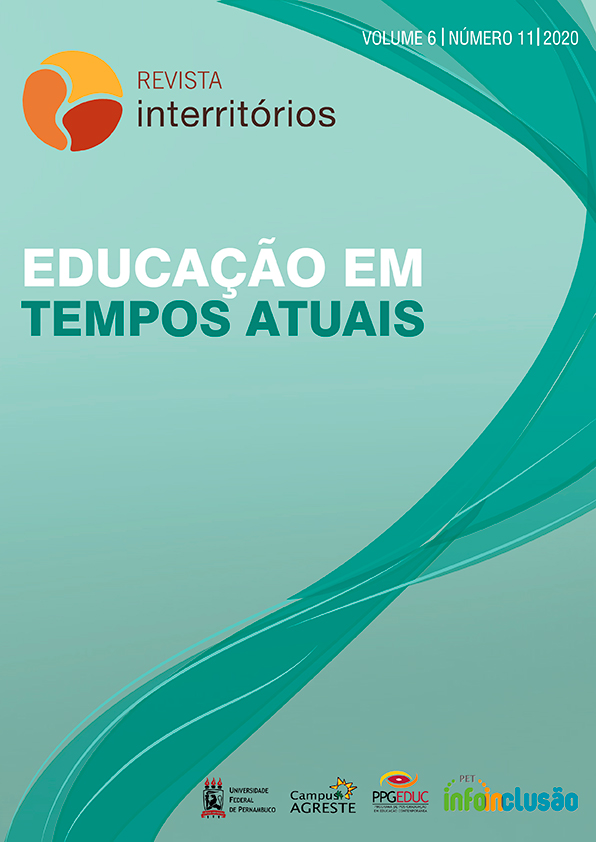Probabilistic Literacy in the Historical-Cultural Theory Perspective
DOI:
https://doi.org/10.33052/inter.v6i11.247745Keywords:
2Historical-Cultural Theory, Probability Teaching, Probabilistic Literacy, Early Years, Elementary SchoolAbstract
Considering that man is a historical and social subject, this bibliographic study has a qualitative methodological approach and explanatory descriptive design, which aims to relate the assumptions of Historical-Cultural Theory (THC) with the teaching of Probability in the early years of Elementary Education focusing on the development of probabilistic literacy and making notes correlating them with curricular references. Thus, throughoutthe text, the intention is to dialogue between concepts and ideas of Historical-Cultural Theory with the cognitive elements related to probabilistic literacy, pointing out considerations of the curricular frameworks of the state of São Paulo and nationally. As main results, we have that the assumptions of this theory can contribute to an educational practice that prioritizes the social aspect and to the acquisition of a richer, more active and more meaningful knowledge to the student.
References
BRASIL. Secretaria de Educação Fundamental. Parâmetros Curriculares Nacionais: matemática. Brasília: MEC/SEF, 1997.
BRASIL. Secretaria de Educação Básica. Base Nacional Comum Curricular: educação é a base. Brasília: MEC, 2017.
CRESWELL, J. W. Projeto de Pesquisa: métodos qualitativo, quantitativo e misto. Porto Alegre: Artmed, 2010.
DAVYDOV, V. V. Tipos de generalizacion en la enseñanza. Havana: Pueblo y Educacion, 1982.
DAVYDOV, V. V. El aporte de Leontiev al desarrollo de la psicología. In: GOLDER, M. (Org.). Angustia por la Utopía. Buenos Aires: Ateneo Vigotskiano de la Argentina, 2002. p. 51-60.
GAL, I. Towards Probability Literacy For All Citizens: building blocks and instructional dilemas. In: JONES, G., (ed.). Exploring Probability in Schools: challenges for teaching and learning. Springer, New York, p. 39-63, 2005.
GIL, A. C. Métodos e Técnicas de Pesquisa Social. 6. ed. São Paulo: Atlas, 2008.
LEONTIEV, A. O Desenvolvimento do Psiquismo. Lisboa: Horizonte, 1978.
LURIA, A.R. A Atividade Consciente do Homem e Suas Raízes Histórico-sociais. In: LURIA, A.R. Curso de Psicologia Geral - vol 1. Rio de Janeiro: Civilização Brasileira, 1979, p.71-84.
LURIA, A. R. Pensamento e linguagem: as últimas conferências de Luria. Trad. Diana Myriam Lichtenstein e Mario Corso. Porto Alegre: Artes Médicas, 1986.
MARTINS, L. M. Fundamentos da Psicologia Histórico-Cultural e da Pedagogia Histórico-Crítica, 2012. Disponível em: http://ead.bauru.sp.gov.br/efront/www/content/lessons/78/Fundamentos%20da%20PHC%20e%20da%20PHC%20-%20MARTINS.pdf Acesso em: 05 out. 2019.
MOURA, M. O. et al. A atividade orientadora de ensino: unidade entre ensino e aprendizagem. Revista Diálogo Educacional, Curitiba, v. 10, p. 205-229, jan./abr. 2010.
ODY, M. C; VIALI, L. Alfabetização, Letramento e Literacia: da aquisição e das habilidades de leitura, de escrita e cálculo, à utilização de suas competências na estatística e na probabilidade. In: CONGRESSO IBERO AMERICANO DE EDUCAÇÃO MATEMÁTICA, 7, 2013, Actas [...], Montevidéu, Uruguai, 2013.
SÃO PAULO (Estado). Secretaria de Estado da Educação. Currículo Paulista. São Paulo: SEDUC-SP, 2019.
VYGOTSKY, L. S. Pensamento e Linguagem. São Paulo: Martins Fontes, 1987.
VYGOTSKY, L. S. A Formação Social da Mente. São Paulo: Martins Fontes, 1991.
Downloads
Published
Issue
Section
License
Copyright (c) 2020 Adriane Buchwitz Del TREJO

This work is licensed under a Creative Commons Attribution 4.0 International License.
1. Proposta de Política para Periódicos de Acesso Livre
Autores que publicam nesta revista concordam com os seguintes termos:
- Autores mantém os direitos autorais e concedem à revista o direito de primeira publicação, com o trabalho simultaneamente licenciado sob a Licença CreativeCommons Atribuição 4.0
Internacional (texto da Licença:https://creativecommons.org/licenses/by/4.0/)que permite o compartilhamento do trabalho com reconhecimento da autoria e publicação inicial nesta revista. - Autores têm autorização para assumir contratos adicionais separadamente, para distribuição não-exclusiva da versão do trabalho publicada nesta revista (ex.: publicar em repositório institucional ou como capítulo de livro), com reconhecimento de autoria e publicação inicial nesta revista.
- Autores têm permissão e são estimulados a publicar e distribuir seu trabalho online (ex.: em repositórios institucionais ou na sua página pessoal) a qualquer ponto antes ou durante o processo editorial, já que isso pode gerar alterações produtivas, bem como aumentar o impacto e a citação do trabalho publicado (Veja O Efeito do Acesso Livre).


